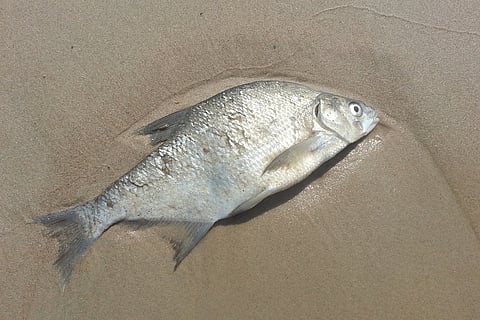

If you are a seafood connoisseur, then the weekend fish-market shopping and elaborate meals made of the fresh catch cannot be missed. But the disastrous oil spill on Chennai’s shores, and the subsequent colossal mismanagement of the crisis by the port, could be leaving you wondering if you should spend Sunday morning walking through fish stalls.
You wouldn’t be wrong in thinking twice about it.
And you certainly aren’t alone. Fishermen associations are already reporting a downturn in sales, thanks to the legitimate paranoia of fish being contaminated. “We will know the true extent of the shortfall in sales tomorrow. The Kasimedu market sells between 120-150 tons of fish on any Sunday. Let’s see,” says Bharati of the Tamil Nadu Fishermen’s Association, admitting that people are already complaining and not willing to buy.
“Chennai, Thiruvallur and Kanchipuram markets will be affected,” he says.
In fact, fishermen themselves are not going fishing, expecting a slump, so that they can at least cut down on their losses, he adds.
But should you really be worried about your fish being contaminated?
According to the US FDA, oil can make seafood unfit for consumption through the presence of certain levels of chemicals known as polycyclic aromatic hydrocarbons, some of which are carcinogenic.
Research has shown that after an oil spill, species that spawn in nearshore and shallow waters are more likely to be contaminated than the ones in deep-sea. Wild finfish are unlikely to be contaminated since they are not exposed to the oil long enough.
Shellfish, however, are more likely to be contaminated since they are more vulnerable. Another US government advisory says, “We also have found that fish eggs in shallow water, such as salmon eggs in a streambed, can be wiped out by an oil spill. Other habitats of concern for fish kills are in contained areas, such as lakes, lagoons, and some shallow-water nearshore areas, where spilled oil naturally concentrates.”
Activist Nityanand Jayaraman points out that in Chennai’s context, seafood like seer fish, barracuda, tuna, horse mackerel and croakers from mid seas should be fit for consumption.
Fishermen, whose livelihood depends on seafood sales, say that there might not be any impact of oil spill on the fish at all. “We don’t think there is any immediate impact, it will be later. As soon as fish species spot oil, they move away. They don’t remain exposed to it. And the oil moves towards the shores. So turtles may die, fish in the deep sea won’t be harmed,” Bharati says, adding that they now go fishing north of Ennore towards Andhra, whereas the spill has affected the sea between Ennore and Chennai.
However, this is not the time to assume safety. It could be a serious health hazard.
In 2012, when there was an oil spill near Mumbai, the municipal corporation conducted random tests and the restaurant associations took seafood off the menu for a month. The government in Tamil Nadu will perhaps do well in monitoring seafood safety.
But what can you do to makes sure your seafood is fine? See and smell it before you buy it. If it smells fishy, it’s fine. If it smells of oil, it’s contaminated. Contaminated seafood will feel rubbery and mushy, and look unhealthy and pale.
If you are considering buying cooked seafood, it would be wise to be very selective and only go to restaurants you trust. But, if you are heading out to Kasimedu tomorrow, at the very least, see the fish, smell it and go for the deep sea varieties. Or just stick to karuvadu for now.